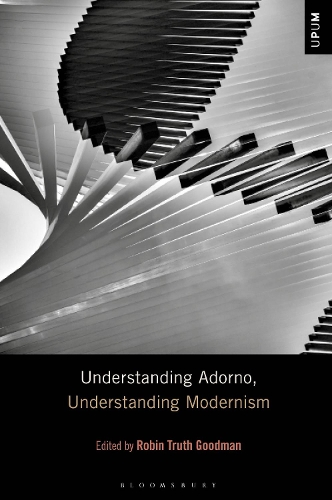
Understanding Adorno, Understanding Modernism
(Hardback)
Available Formats
Publishing Details
Understanding Adorno, Understanding Modernism
By (Author) Professor Robin Truth Goodman
Bloomsbury Publishing PLC
Bloomsbury Academic USA
12th November 2020
United States
Classifications
Tertiary Education
Non Fiction
Literary theory
Western philosophy from c 1800
193
Physical Properties
Hardback
296
Width 152mm, Height 229mm
562g
Description
Having studied philosophy at a time when its traditions were being seriously uprooted by the atrocities of World War II, Theodor Adorno had an enormous impact on thinking about aesthetics at a transitional historical moment when the philosophy of science and leftist politics were looking for new ground. Moreover, with his focus on the rise of commercial culture and its effects on identity-construction, Adorno can be said to have reinvigorated modernist concerns by introducing the prevailing terms in our contemporary versions of cultural politics and cultural studies. Understanding Adorno, Understanding Modernism traces Adornos social and aesthetic ideas as they appear and reappear in his corpus. As per other volumes in the series, this book is divided into three parts. The first, Adornos Keywords, is organized by the aesthetic terms around which Adornos philosophy circulates. The second section is devoted to Adorno and Aesthetics. While Adornos philosophical viewpoints influenced modernisms evolution into the 21st century, the history of modernist aesthetics also shaped his philosophical approaches. The third and final part, Adornos Constellations, discusses how aesthetic form in Adornos thinking underlies the terms of his social analysis.
Reviews
Reading this dazzling collection of essays is like gazing through a kaleidoscope after a fresh constellation of colored glass has been created by a twist of the hand. For readers who think they already know everything that Adorno had to say about modernism and modernity, the results will be both illuminating and unsettling. * Martin Jay, Sidney Hellman Ehrman Professor of History Emeritus, UC, Berkeley, USA *
Even as it was failing and fading, modernism for Adorno remained an expression and the signature immanent critique of the modes of domination and repression constitutive of capitalist modernity. In this vibrating series of essays, Adornos habitation in modernism is surveyed, exemplified, and expanded. Beyond the expected engagements with his modernist aesthetics and music, his writings on lyric poetry, Beckett, mimesis, and culture industry, the reader will also find essays connecting modernism with performance, camp, recorded music (on vinyl), and Adornos trenchant musings on the human, animals, and the arts. A generous addition to the literature on Adornos modernism. * J. M. Bernstein, Distinguished Professor of Philosophy, New School for Social Research, USA *
Author Bio
Robin Truth Goodman is Professor of English at Florida State University, USA. She is the author or editor of ten previous books, including Gender for the Warfare State: Literature of Women in Combat (2017) and, as editor, Literature and the Development of Feminist Theory (2016).
